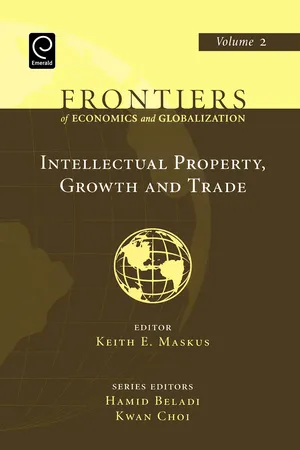
- 782 pages
- English
- PDF
- Available on iOS & Android
Intellectual Property, Growth and Trade
About This Book
In recent years intellectual property rights (IPR) took on major significance as an element of global trade regulation. The Agreement on Trade-Related Aspects of Intellectual Property Rights (TRIPS) at the World Trade Organization (WTO) obliges member countries to protect patents, copyrights, trademarks, and trade secrets. This mandate has great impact in developing nations, which had generally weaker IPR standards prior to TRIPS and subsequent agreements. This emerging international regime for protecting IPR raises thorny questions about how the new rules of the game might affect fundamental economic processes, including innovation, trade and economic development. The governments of many developing countries see the new regime as excessively protectionist and an impediment to their development prospects. They perceive potential problems with abusive monopoly practices, high costs for new medicines, and limited access to scientific and educational materials. Indeed, it is ironic that during a time of significant global liberalization of trade and investment barriers, the IPR system may be raising restrictions on access to the very technology flows that could substantiate the gains from greater trading opportunities. However, expansion of the global IPR regime also bears potential for economic gains. It is possible that the new system will encourage additional investments in R&D and innovation. The ongoing internationalization of commercial R&D could be accelerated. Such investments might increasingly meet the medical, agricultural, and educational needs of people in poor countries. The regime could also improve the mechanisms under which new information goods are transferred across borders, expanding the possibilities for fruitful diffusion of technologies. The implications of these reforms will be far-reaching, complex and hard to predict. It is possible, for example, that stronger patents will simply redistribute incomes across nations, generating significant winners and losers without much overall innovation gains. It is also possible that R&D investments could become more concentrated among the developed and newly industrialized economies but bypass the poorer locations. Ultimately, all such questions need close theoretical and empirical scrutiny. In this volume several economists who are closely involved in such analysis offer comprehensive and analytical literature surveys of the central questions regarding the linkages between intellectual property protection, international trade and investment, and economic growth. The authors range widely over their particular areas of inquiry. At the international level the contributions cover such questions as policy coordination in IPR, dispute resolution, markets for technology and technology transfer, international innovation, parallel trade, and economic development. On the regulatory side there are thoughtful reviews of the legal foundations of IPR, knowledge creation and the public domain, networks and standards, competition policy, access to essential medicines, and agricultural research. The contributions are aimed primarily at economists, who will find ambitious and up-to-date treatments of the most central areas of IPR and globalization. The chapters analyze recent literature, discuss shortcomings and key findings, and indicate where additional research is urgently needed. However, scholars of other disciplines, particularly in law, political science, and international relations, will find much of interest as well. The literature reviews also constitute a valuable resource for students in all these fields who wish to learn more about the economics of international IPR. This book brings together fresh insights from top economists. It considers various aspects of IPRs in the global economy from analytical and empirical perspectives. Areas covered include information technology, trade, investment, agriculture, medicine, firm behavior, and development.
Frequently asked questions
Information
Table of contents
- Front cover
- Intellectual Property, Growth and Trade
- Copyright page
- About the Series: Frontiers of Economics and Globalization
- List of Contributors (In Alphabetical Order)
- Contents
- Chapter 1. Introduction
- Chapter 2. The Law and Economics of International Intellectual Property: A Primer
- Chapter 3. Patents and Information Diffusion
- Chapter 4. Patents and the Market for Technology
- Chapter 5. Networks, Standards and Intellectual Property Rights
- Chapter 6. Knowledge Creation and Diffusion of Public Science with Intellectual Property Rights
- Chapter 7. Intellectual Property Rights and Competition Policy
- Chapter 8. Intellectual Property Rights, Parallel Imports and Strategic Behavior
- Chapter 9. Intellectual Property Rights and International Innovation
- Chapter 10. Intellectual Property Rights and International Technology Transfer via Trade and Foreign Direct Investment
- Chapter 11. The Theory of International Policy Coordination in the Protection of Ideas
- Chapter 12. The Theory of Dispute Resolution with Application to Intellectual Property Rights
- Chapter 13. Patents and Access to Essential Medicines
- Chapter 14. The Scientific Origins of the Green and Gene Revolutions
- Chapter 15. Incorporating a Globalized Intellectual Property Rights Regime into an Economic Development Strategy
- Subject Index